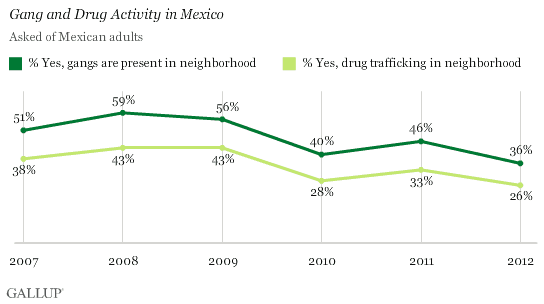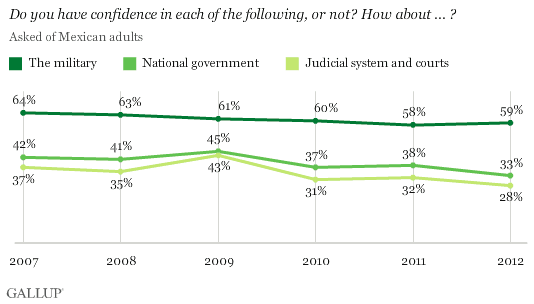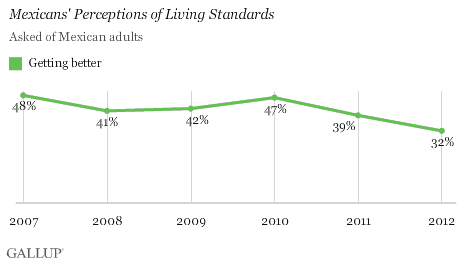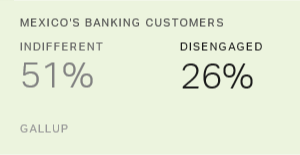WASHINGTON, D.C. -- Ahead of Mexico's presidential election this weekend, Gallup surveys suggest Mexicans are seeing some progress on one of the top issues on the campaign trail -- the country's ongoing drug war. Far fewer Mexicans surveyed in late March and early April of this year report gang activity (36%) and drug trafficking (26%) in their neighborhoods than did so when outgoing President Felipe Calderon launched his battle against the drug cartels six years ago.

All three major-party candidates are offering new strategies to end the drug-related violence, which has some U.S. lawmakers nervous about the outcome of Sunday's vote. According to CNN, a Republican congressman last week shared his concerns about Mexico's "impending change in power" with the head of the U.S. Drug Enforcement Administration.
Confidence in Government Falls Despite Lower Perceived Drug, Gang Activity
The improvement in reported drug and gang activity hasn't translated into higher confidence in the national government and other institutions, which may not bode well for the ruling National Action Party's candidate Josefina Vazquez Mota. Mexicans' confidence in the national government has declined nearly 10 percentage points since 2007, falling to 33% in early 2012. Additionally, slightly fewer than three in 10 Mexicans (28%) have faith in the judicial system, down from 37% in 2007. Even confidence in the military -- the same forces Calderon employed continuously in the fight against drug cartels -- has flagged slightly to 59% today from 64% in 2007.

Mexicans' Perceptions of Living Standards Slump Dramatically
Mexicans' decreasing confidence in their own economic situations also may not bode well for the National Action Party. Mexicans' outlook on their living standards is the bleakest Gallup has ever recorded, with less than a third (32%) saying their living standards are getting better. Clearly, any post-crisis economic uptick has not reached the majority of Mexicans, giving them one more reason to lack confidence in their government.

Bottom Line
Some improvement in local gang and drug activity during Calderon's term does not appear to have generated sufficient progress to increase Mexicans' confidence in the national government and its institutions. Voters will likely give careful consideration to the prospective security strategies and fiscal reforms of all three candidates. Whoever wins the presidency on July 1 -- current front-runner Enrique Pena Nieto, Andres Manuel Lopez Obrador, or Mota -- will need to make far deeper inroads into quelling the drug violence and addressing serious economic change if Mexican citizens are to begin to feel safer on the streets and more prosperous.
For complete data sets or custom research from the more than 150 countries Gallup continually surveys, please contact SocialandEconomicAnalysis@gallup.com or call 202.715.3030.
Survey MethodsResults are based on face-to-face interviews with approximately 1,000 adults, aged 15 and older, conducted annually between 2007 and 2012 in Mexico. The most recent interviews were conducted between March 31 and April 11, 2012. For results based on the total sample of national adults, one can say with 95% confidence that the maximum margin of sampling error is ±3.8 percentage points. The margin of error reflects the influence of data weighting. In addition to sampling error, question wording and practical difficulties in conducting surveys can introduce error or bias into the findings of public opinion polls.
For more complete methodology and specific survey dates, please review Gallup's Country Data Set details.
